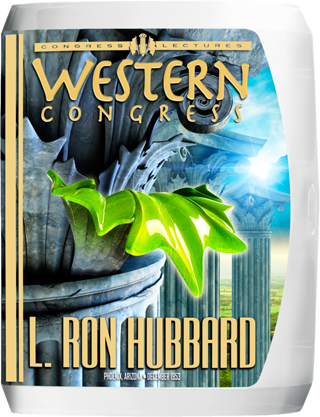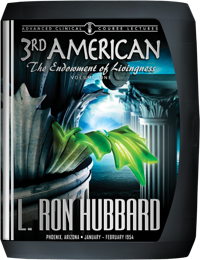Publisher of New York Times and International Bestselling Author L. Ron Hubbard
Western Congress

Western Congress
With Scientologists in the western United States clamoring for a Congress in their own locales, L. Ron Hubbard convened a “Western Congress” in Phoenix, Arizona. What particularly set this Congress apart was how he imparted the data on his latest breakthroughs, for as reported in the Journal of Scientology, “presentation of technical material was kept to an absolute minimum, L. Ron Hubbard presenting the majority of the important technique and procedure in the form of processes upon the group.” In this way, he provided a model for delegates to group process people in their own communities, with the concentration on Standard Operating Procedure 8-C (SOP 8-C) and Self Analysis lists. Here, too, was Mr. Hubbard’s introduction of the new audio meter (later known as a “beep meter”), the most advanced meter to date, not only featuring a probe that could register pain spots on a human being but providing the means to demonstrate that a being can create an energy current in another being. In sum, here was a Congress packed with technical data, expanding the ranks of trained Scientologists who carried these breakthroughs to a broader public and, thereby, generating a healthy crop of new field groups.
About Western Congress
Man is on the high road at last. Because all of the evils of Man come from Man’s effort to deny freedom to Man. His lack of culture is most apparent where slavery has the greatest root.
And where you have men who are free, they can do a lot of things. Work becomes a pleasure. The handling of effort itself becomes a very desirable activity. And things get built, the world becomes more beautiful. Man is able to engage in life as a game rather than as a slavery.
And so we get another culture. —L. Ron Hubbard
The year 1953 was drawing to a close and the First International Congress of Dianeticists & Scientologists in Philadelphia had proved so successful—“simply out of this world,” according to a Scientology journal—that Scientologists in the western United States were clamoring for a Congress in their own locales. With Los Angeles, California and Phoenix, Arizona, the main contenders, L. Ron Hubbard settled on Phoenix, located in Scientology’s home state and site of the first Hubbard Association of Scientologists, now in existence for two years.
So it was that on December 28, 1953, in the city’s Little Theater, Mr. Hubbard convened a Congress like none other before or since. For whereas the Western Congress shared all the features that would soon become traditional—including his announcement of new breakthroughs and an end-of-Congress party—what particularly set this Congress apart was how he imparted the data. Specifically, and as reported in the Journal of Scientology, “presentation of technical material was kept to an absolute minimum, L. Ron Hubbard presenting the majority of the important technique and procedure in the form of processes upon the group.”
Now purely from an auditing viewpoint those processes proved sweepingly effective, with several at the Congress blowing chronic somatics and others attaining Theta Clear. But there was a broader reason why that Little Theater marked the spot where a boom began. By processing the group, Mr. Hubbard provided a model for delegates to group process people in their own communities, with the concentration on Standard Operating Procedure 8-C (SOP 8-C) and Self Analysis lists. And to make their task even easier, prior to the Congress he had specially cut a recording of a 15-minute Group Process that was given to each delegate, enabling them to start immediately on returning home.
Then there were the pyrotechnics, dramatically including a demonstration of the handling of anchor points. With his body remaining in exactly the same spot before the microphone, he continued speaking while shifting his anchor points to exact locations both inside and outside the Little Theater—a demonstration that required no change in his use of vocal chords. It did, however, produce an immediate change in the way his voice carried to the audience, thus illustrating a fundamental datum applicable not only to Group Processing but to living:
“Hearingness is not much of a sound wave problem. It’s a problem in beingness. And you can be heard in as much space as you are willing to be in and that’s all the space you can be heard in. You understand me?”
Here, too, was Mr. Hubbard’s introduction of the new “audio meter” (later known as a “beep meter”), an instrument surpassing any previous model and featuring a probe that could register pain spots on a human being. Yet he had discovered a use for that meter of which even its manufacturer had been unaware. Here, in fact, was a means to demonstrate that a being can, at will, create an energy current in another being:
“So I took his own meter and I showed him where all the dead spots were in his cheek and so forth. We got one that was real good and dead and I sat back and made it turn on. And it turned on and the meter said ‘powwww.’”
In sum, here was a Congress packed with technical data, and all with one purpose in mind: expanding the ranks of trained Scientologists who would carry these breakthroughs to a broader public. And that’s exactly what occurred—to dramatic effect. With the results ringing out across the United States, the lectures and Group Processing sessions were played at congresses held by others, producing immediate case gain and generating a healthy crop of new field groups. In fact, the Western Congress not only previewed the 3rd American Advanced Clinical Course, it also inspired the phenomenally successful Universe Processes Congress, held by Mr. Hubbard in the same location before well over 200 Scientologists from all over the United States and overseas.
Thus, as 1953 closed, all was set for the historic advances of 1954 and L. Ron Hubbard’s announcement of processes to produce, en masse, a state of beingness once considered possible, if at all, by only a select few.
| Format: | Compact Disc |
| Lectures: | 20 |
